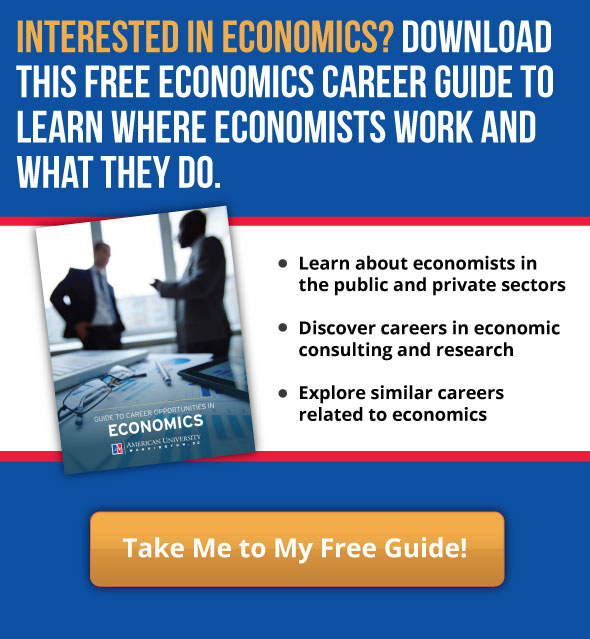Thinking like an economist can seem like a skill limited to solving problems of the marketplace, but this type of thinking can be applied in many areas outside the field of economics. Thinking like an economist can help avoid irrational decision-making, can aid professionals in improving the decisions that affect their lives and can help you better understand the world around you. Once you learn to think like an economist, you will see how virtually all decisions—from something as small as where to go to dinner to whether to begin a new career or go back to school for a master’s degree—become clearer.
What does thinking like an economist mean?
 At its most basic, thinking like an economist means evaluating the facts without allowing opinion or logical fallacies to enter into the calculation. Economic theory is fundamentally about the idea of scarcity, the idea that everyone—individuals, corporations and governments—only have limited resources and must decide how and where those resources will be allocated. Economists evaluate the “cost” of individual and social choices to determine the best choices for themselves or others in the face of this scarcity.
At its most basic, thinking like an economist means evaluating the facts without allowing opinion or logical fallacies to enter into the calculation. Economic theory is fundamentally about the idea of scarcity, the idea that everyone—individuals, corporations and governments—only have limited resources and must decide how and where those resources will be allocated. Economists evaluate the “cost” of individual and social choices to determine the best choices for themselves or others in the face of this scarcity.
Assembling an intellectual toolkit similar to that of the economist can help you make smarter decisions in your professional and personal life. There are three basic concepts that form the foundation of economic thinking:
- The Cost of Something is What You Give Up
Opportunity cost is a fundamental economic theory and one of the most important to understand if you want to think more like an economist. Opportunity cost teaches that nothing in life is free, even if it doesn't cost money. Understanding opportunity cost can help those who want to think like an economist to decide, for example, if going to graduate school is worth the cost. If getting a master's degree is something you are considering, think like an economist and weigh the costs and benefits of that decision. Some of the opportunity costs of obtaining a master’s degree may be less time to spend on hobbies or leaving the workforce for a couple years; compare these opportunity costs to the benefits of having a master’s degree to make a rational, economist-like decision. - Incurred Costs Cannot Be Recovered
Sunk cost is one of the most pervasive fallacies that an economist’s mindset can help you overcome. Simply stated, a sunk cost is any cost that has already been incurred and therefore cannot be recovered regardless of future outcomes. Think of this example: You buy a ticket to a movie and settle in only to realize halfway through that the movie is terrible—what do you do? Most people will sit through to the end, thinking if they leave their money will have been “wasted.” But if you think like an economist, you know sunk costs are already gone. Furthermore, you now understand the opportunity cost of giving up more valuable time watching a movie you don’t enjoy. The sunk cost bias is often talked about by economists as, “throwing good money after bad,” but it’s important to remember that it isn’t just about money; any type of investment you make—money, time, effort—is subject to this type of thinking. - People Respond to Incentives
In An Introduction to the Economics of Information: Incentives and Contracts, by Inés Macho-Stadler and David Peréz-Castrillo, there is a brief mention of the Ukrainian pole vaulter Sergei Bubka, who broke the world record in pole vaulting 35 times from 1986 to 1995. By any measure that is an incredible feat, but it becomes more rational (and more apropos to the subject of thinking like an economist) when you understand Bubka's incentives. The Soviet Union at the time was offering athletes $30,000 every time they broke a world record. Bubka thought like an economist and decided instead of breaking the world record once, by a larger margin, he would break it 35 times, earning himself more than $1 million. This incentive theory plays out in daily life all the time. Evaluating how you respond to incentives in the world you and thinking about how other people respond to incentives you offer is an essential part of thinking like an economist.
Learn How to Think Like an Economist
Learning to think like an economist can add a great deal of value in your life, and can make confusing or difficult decisions easier. One way to learn economic thinking is to enroll in a master's program that teaches you economic thinking and how to apply it in everyday life. American University’s top-ranked online Master’s in Economics teaches students how to apply economic theories and principles to solve real world problems.
To learn more about the online MA in Economics, call (855) 725-7614 or request more information.




